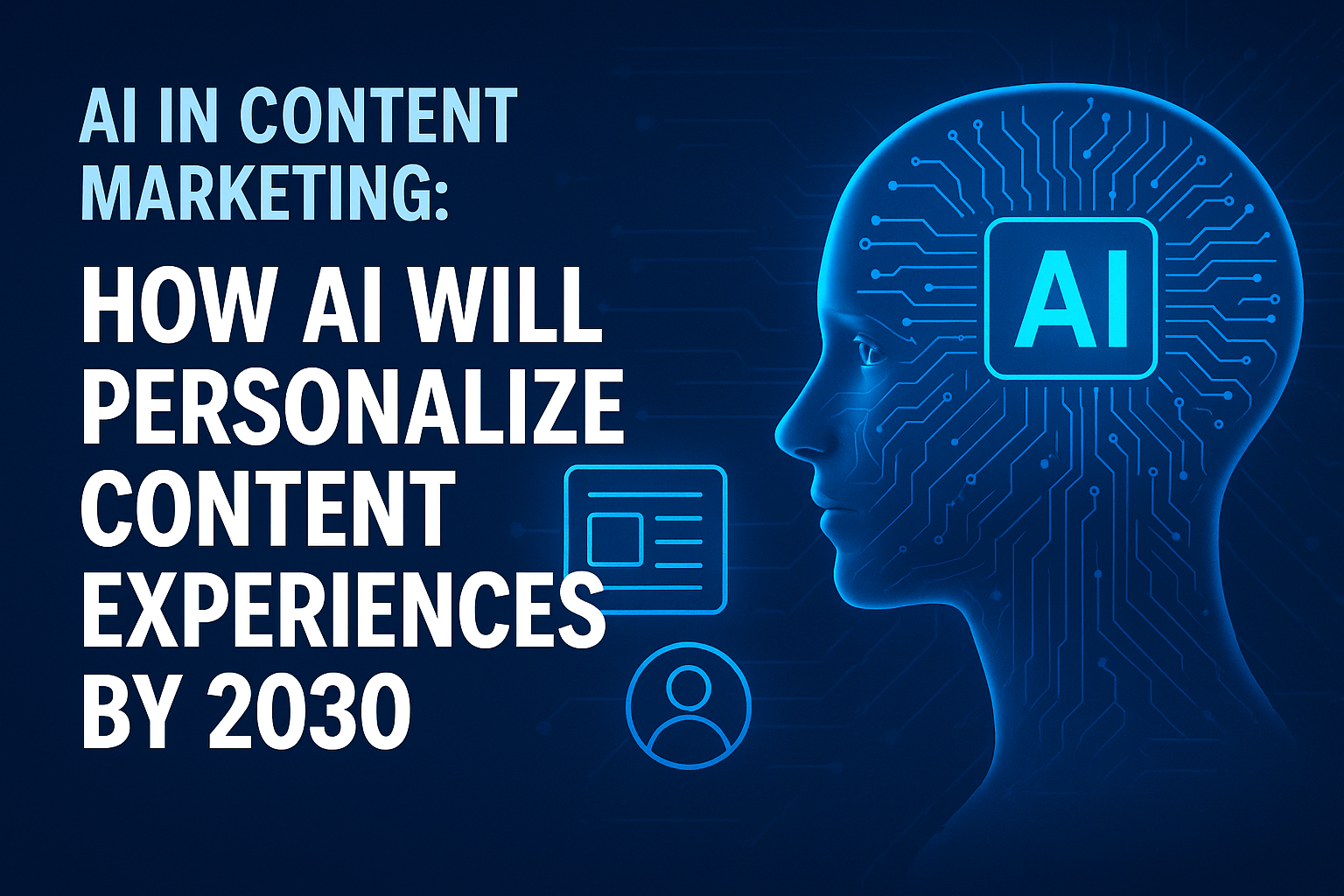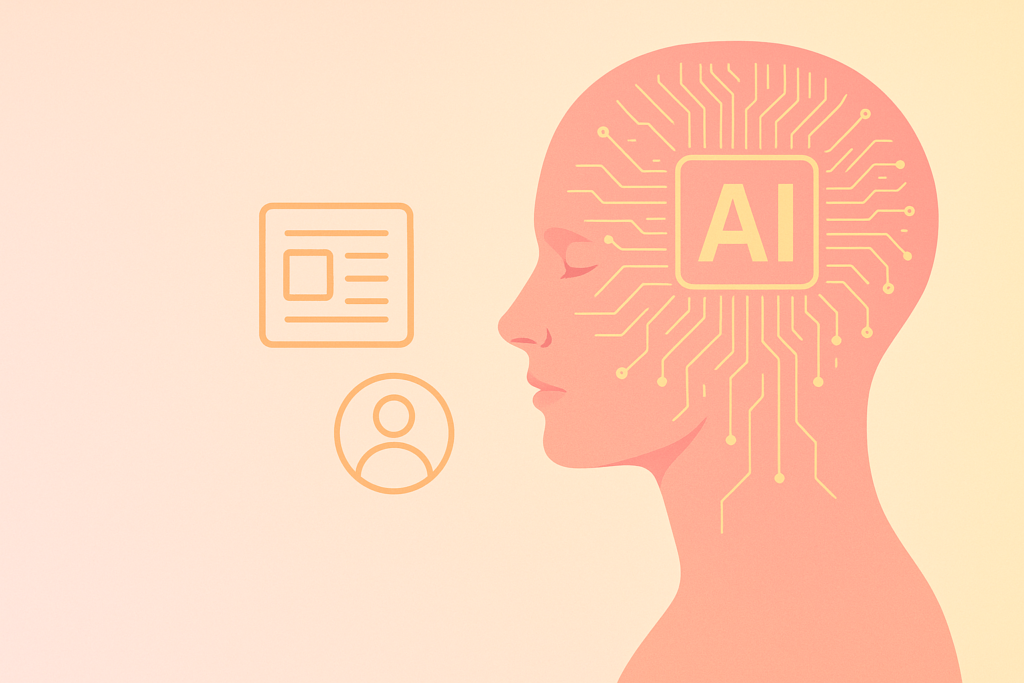Physical Address
304 North Cardinal St.
Dorchester Center, MA 02124
Physical Address
304 North Cardinal St.
Dorchester Center, MA 02124

Content marketing has come a long way. In the past, businesses would simply publish blog posts or social media updates and hope for the best. Today, it’s not just about creating content—it’s about creating the right content for the right person at the right time. That’s where AI comes in.
AI in content marketing is changing the game. It’s helping brands understand their audiences better, create personalized messages, and deliver content that feels made just for you. Whether it’s suggesting the perfect product or sending you an email that speaks to your interests, AI is behind it.
As we look ahead to 2030, the role of AI will only grow. It will not only speed up content creation but also make experiences more personal than ever before. In this blog, we’ll explore how AI is transforming content marketing, how it creates personalized content experiences, and what the future of AI in marketing might look like.

So, what exactly is AI in content marketing? In simple terms, it’s using smart technology to help businesses create and share content in a more effective way. Instead of relying only on people to decide what content to make, AI uses data and patterns to guide the process.
For example, AI can look at things like your browsing history or what you like on social media. It then helps businesses understand what type of content you would enjoy or find helpful. This means that when you visit a website, you might see articles, videos, or product recommendations that are just right for you—without the company needing to guess.
AI also helps content creators and marketers by suggesting ideas, writing content, or even helping to improve what’s already there. It makes the whole process faster and more personalized. So instead of sending the same message to everyone, AI helps businesses send content that fits each person’s interests.
In short, AI for content creators is all about making content smarter and more tailored to what each person wants to see. It’s not just about working faster—it’s about connecting better with the audience.
Personalization has always been important, but today, it’s everything. People want content that feels like it was made just for them. Think about it: when you receive an email with products you’re actually interested in or see ads for things you care about, you’re more likely to engage. That’s the power of personalized content.
Thanks to AI in content marketing, businesses can now tailor their messages based on a person’s interests, behaviors, and past interactions. Instead of sending the same email to everyone on the list, AI can help send the right message to the right person. This makes customers feel valued and understood, which can lead to better engagement, loyalty, and sales.
Personalization isn’t just about making things more relevant—it’s also about making things more enjoyable. With AI personalization tools, companies can create experiences that surprise and delight users, keeping them engaged longer and encouraging them to return. For example, you might see personalized blog recommendations or products that fit your unique style.
Looking ahead, as AI personalization tools continue to improve, we’ll see even more ways to make content feel personal and relevant to each individual. By 2030, the possibilities for AI-driven content personalization will be endless, transforming how brands interact with their customers.
Today, AI-driven content personalization is helping businesses create more meaningful connections with their customers. But how exactly is it doing this? It all comes down to the way AI understands people’s needs and preferences by analyzing data. This data comes from things like browsing behavior, purchase history, and even social media activity.
For example, when you visit an online store, AI can recommend products that you’re most likely to be interested in. It doesn’t just rely on one person’s choices; instead, it looks at patterns from many people with similar tastes. This helps businesses show you content—whether it’s a product, article, or video—that feels relevant to your interests.
This type of personalization is more than just making recommendations—it’s about creating experiences that feel tailor-made. AI helps businesses send the right messages to the right people at the right time, whether through emails, social media ads, or even blog content.
AI personalization tools like machine learning algorithms or recommendation engines help companies understand what their customers want. By doing this, businesses can keep users engaged and coming back for more.
Looking ahead to 2030, AI in content marketing is set to become even more powerful. As technology continues to advance, AI will play a bigger role in creating personalized content experiences. Imagine visiting a website that instantly understands your preferences and shows you content tailored just for you. This level of personalization will become the norm, not the exception.
AI personalization tools will evolve to offer even more precise recommendations. These tools will analyze your behavior, interests, and past interactions to suggest content that truly resonates with you. Whether it’s articles, videos, or product suggestions, AI will ensure that the content you see is relevant and engaging.
Moreover, AI-driven content personalization will extend beyond websites. It will influence the content you see on social media, in emails, and even in advertisements. Brands will use AI to deliver consistent and personalized messages across all platforms, enhancing your overall experience.
To learn more about how AI is transforming content personalization, check out this insightful article from HubSpot: AI Content Personalization That Works: Tips to Transform Your Website.
Creating high-quality content can be time-consuming. But with AI for content creators, businesses can streamline the process and produce content faster. AI-powered tools can generate blog posts, social media updates, and even video scripts in a fraction of the time it would take a human writer. This means marketers and content creators can focus more on strategy and creativity, rather than spending hours on basic writing tasks.
One of the biggest advantages of using AI in content marketing is that it can help create content that’s not only fast but also highly relevant. AI tools can analyze data and trends to suggest content topics that will resonate with your audience. This allows businesses to stay ahead of the curve by creating content that addresses current interests and concerns.
For example, AI can suggest trending keywords, helping content creators optimize their articles for search engines. It can even improve the writing process by offering grammar suggestions, style improvements, and tone adjustments. With these tools, AI-powered content creation is more than just an option—it’s becoming a key part of successful marketing strategies.
When it comes to online content, it’s not just about creating great material; it’s also about making sure people see it. That’s where AI in SEO comes in. AI tools can help businesses improve their content’s visibility by optimizing it for search engines like Google. These tools analyze the latest search trends and keywords to ensure content ranks higher in search results, making it easier for potential customers to find.
AI can also assist in making content more engaging. It can track how users interact with content, such as how long they stay on a page or which links they click. By understanding these patterns, AI can suggest changes to improve engagement—like adjusting headlines, changing content structure, or recommending more relevant links.
AI-driven SEO tools can even predict which keywords will perform best, making it easier to create content that will rank higher. This means businesses can spend less time guessing what will work and more time producing content that connects with their audience.
For more insights into how AI in SEO is changing the landscape, check out this.
Once content is created, the next step is getting it out there. This is where AI-driven content distribution comes into play. AI tools can help businesses automatically share content across multiple channels, such as email, social media, and websites, ensuring it reaches the right audience at the right time. AI doesn’t just push content out randomly—it uses data to decide the best time and platform for each piece of content, maximizing its impact.
For example, AI can analyze the behavior of your audience to figure out when they’re most likely to be online or what platform they engage with the most. Based on this, it can schedule posts, send emails, or even suggest content in real-time. This automation saves time and ensures businesses can maintain a consistent presence across all channels without constant manual effort.
With AI in content marketing, automation doesn’t mean losing the personal touch. Instead, AI helps businesses deliver more relevant content to their audience in a way that feels natural and thoughtful. As a result, businesses can build stronger relationships with customers, leading to higher engagement and better long-term success.
To dive deeper into how AI in content distribution works, check out this article from Content Marketing Institute: How to Automate Content Distribution with AI.
As AI in content marketing continues to grow, businesses must address important ethical considerations to ensure responsible usage. While AI offers incredible benefits, such as automation and personalization, it also comes with challenges that need to be managed carefully. Below are the key ethical concerns in AI-powered content marketing:
AI tools heavily rely on consumer data to create personalized experiences. Businesses must be transparent about how they collect, store, and use this data. Ensuring privacy and security is crucial for maintaining trust with your audience.
AI systems can inherit biases from the data they are trained on. If not properly managed, AI could deliver skewed or discriminatory content, leading to unfair experiences for certain groups. It’s essential to regularly audit AI algorithms to ensure they are making unbiased decisions.
While AI can automate content creation, it’s important for businesses to preserve their brand’s voice and values. AI-generated content should still feel genuine and aligned with the company’s messaging, so customers continue to feel connected.
Being upfront about using AI in content creation and distribution is key. Consumers appreciate knowing when they’re interacting with AI-generated content, and businesses should ensure clear communication about their AI-driven processes.
By addressing these ethical considerations, businesses can use AI to enhance their content marketing strategies without compromising trust or authenticity. It’s essential to be responsible in how AI is used to ensure long-term success.
To explore more about AI and ethical concerns in content marketing, check out this article: Ethics of AI

As we look toward the future, AI in content marketing will continue to evolve and transform the way businesses interact with their audiences. By 2030, we can expect even more advanced AI tools and technologies that will make content creation, distribution, and personalization smarter and more efficient than ever before.
Some potential advancements include:
The future of AI in content marketing promises to be exciting, with endless possibilities for businesses that are willing to embrace the change. Companies that adopt AI will not only stay ahead of the competition but will also be better equipped to meet the ever-changing needs of their audiences.
To stay up-to-date on the latest trends in AI and marketing, be sure to follow our blogs on Iceberg AI Content.
Thanks for sharing. I read many of your blog posts, cool, your blog is very good.
I don’t think the title of your article matches the content lol. Just kidding, mainly because I had some doubts after reading the article.